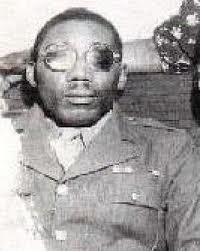Snippet from History #1: The Blinding of Isaac Woodard
It isn’t possible in my estimation to understand our current epidemic of hyper-incarceration without delving into the way that race is always the organizing principle in the treatment of black people in the United States. In the coming weeks, I will specifically highlight incidents from the American past that still resonate with our current criminal legal system (particularly for black people). Some of these incidents might be familiar to you and others will be new. If you have ideas of other incidents that I should feature, please feel free to share those with me. To begin the series, I will focus on a 1946 incident of police violence involving Isaac Woodard which became nationally known and helped to advance the civil rights movement.
In February 1946, a 27 year old black man named Isaac Woodard was on his way home on a Greyhound bus after having recently served in World War II. He was leaving Camp Gordon in Augusta Georgia and heading to North Carolina to visit family.
During a stop, Sergeant Woodard asked the bus driver if he had time to run out and use a bathroom. The driver told him no and then cursed him out. Woodard cursed him back and the driver told him that he could go ahead to use the bathroom. The driver was white and this becomes an important fact in the story.
 At the next stop which was Batesburg, South Carolina, the driver called the police and claimed that Woodard was drunk and quarrelsome. The young veteran was taken off the bus by Police Chief Lynwood Shull, beaten with a club and then jailed. When he arrived at the jail, Isaac Woodard was punched in the eyes with the end of a billy club. When he awoke the next morning, he was blind.
At the next stop which was Batesburg, South Carolina, the driver called the police and claimed that Woodard was drunk and quarrelsome. The young veteran was taken off the bus by Police Chief Lynwood Shull, beaten with a club and then jailed. When he arrived at the jail, Isaac Woodard was punched in the eyes with the end of a billy club. When he awoke the next morning, he was blind.
The case of Isaac Woodard gained national attention and became a rallying cry for many in the black community who were incensed at the treatment that returning veterans were experiencing at the hands of white people. When Orson Welles began to talk about the incident on his ABC-Radio show Orson Welles Commentaries, Isaac Woodard gained even more notoriety. In August 1946, 20,000 people came to a rally in Harlem to raise money for his care and to contribute to his living expenses.
Unfortunately in November 1946, Police Chief Shull was acquitted of federal civil rights charges and in 1947, Woodard sued Greyhound but lost there too.
In 1946, Woodie Guthrie wrote a song titled “The Blinding of Isaac Woodard” that tells the story of this incident. Here are the final three verses of the song:
They beat me about the head and face and left a bloody trail
All down along the sidewalk to the iron door of the jail;
He knocked me down upon the ground and he poked me in the eyes;
When I woke up next morning, I found my eyes were blind.They drug me to the courtroom, and I could not see the judge;
He fined me fifty dollars for raising all the fuss;
The doctor finally got there but it took him two whole days;
He handed me some drops and salve and told me to treat myself.It’s now you’ve heard my story, there’s one thing I can’t see,
How you could treat a human like they have treated me;
I thought I fought on the islands to get rid of their kind;
But I can see the fight lots plainer now that I am blind.
For those who are interested in learning more about this story, I highly recommend listening to the Orson Welles Commentaries about the case which can be found here. You should click on the “Affidavit of Isaac Woodard” and “the Place was Batesburg” links to hear the commentaries.
Update: The Malcolm X Grassroots Movement has just released a new report about the extra-judicial killing of black people in the United States. This is timely and incredibly important. William Faulkner is credited with having said that in the South, “the past is never dead, it’s not even past.” I would extend this to the entire country.
